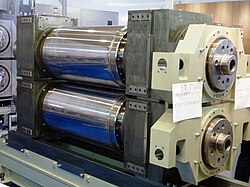kalander
Appearance
Dutch
[edit]Alternative forms
[edit]Etymology
[edit]Borrowed from Middle French calandre in the 15th or 16th century, ultimately from Ancient Greek κύλινδρος (kúlindros, “cylinder”). Cognate with English calander. Doublet of cilinder.
Pronunciation
[edit]Audio: (file)
Noun
[edit]kalander f (plural kalanders, diminutive kalandertje n)
Descendants
[edit]- Afrikaans: kalander
References
[edit]- van der Sijs, Nicoline, editor (2010), “kalander2”, in Etymologiebank, Meertens Institute
Further reading
[edit] kalander on the Dutch Wikipedia.Wikipedia nl
kalander on the Dutch Wikipedia.Wikipedia nl
Middle English
[edit]Noun
[edit]kalander
- Alternative form of kalender
Norwegian Bokmål
[edit]Pronunciation
[edit]Noun
[edit]kalander m (definite singular kalanderen, indefinite plural kalandere or kalandre or kalandrer, definite plural kalanderne or kalandrene)
References
[edit]- “kalander” in The Bokmål Dictionary.
Norwegian Nynorsk
[edit]Noun
[edit]kalander m (definite singular kalanderen, indefinite plural kalandrar, definite plural kalandrane)
References
[edit]- “kalander” in The Nynorsk Dictionary.
Polish
[edit]
Pronunciation
[edit]Etymology 1
[edit]Borrowed from French calandre. Doublet of cylinder.
Noun
[edit]kalander m inan (related adjective kalandrowy)
- calender (machine used for the purpose of giving cloth, paper, etc., a smooth, even, and glossy or glazed surface, by cold or hot pressure, or for watering them and giving them a wavy appearance; it consists of two or more cylinders revolving nearly in contact, with the necessary apparatus for moving and regulating)
- Synonym: gładziarka
Declension
[edit]Declension of kalander
| singular | plural | |
|---|---|---|
| nominative | kalander | kalandry |
| genitive | kalandra | kalandrów |
| dative | kalandrowi | kalandrom |
| accusative | kalander | kalandrów |
| instrumental | kalandrem | kalandrami |
| locative | kalandrze | kalandrach |
| vocative | kalandrze | kalandry |
Derived terms
[edit]nouns
verbs
- kalandrować impf
- skalandrować pf
Etymology 2
[edit]See the etymology of the corresponding lemma form.
Noun
[edit]kalander f
Further reading
[edit]Categories:
- Dutch terms borrowed from Middle French
- Dutch terms derived from Middle French
- Dutch terms derived from Ancient Greek
- Dutch doublets
- Dutch terms with audio pronunciation
- Dutch lemmas
- Dutch nouns
- Dutch nouns with plural in -s
- Dutch feminine nouns
- nl:Weevils
- Middle English lemmas
- Middle English nouns
- Norwegian Bokmål terms with IPA pronunciation
- Norwegian Bokmål lemmas
- Norwegian Bokmål nouns
- Norwegian Bokmål masculine nouns
- Norwegian Nynorsk lemmas
- Norwegian Nynorsk nouns
- Norwegian Nynorsk masculine nouns
- Polish 3-syllable words
- Polish terms with IPA pronunciation
- Polish terms with audio pronunciation
- Rhymes:Polish/andɛr
- Rhymes:Polish/andɛr/3 syllables
- Polish terms derived from Middle French
- Polish terms derived from Latin
- Polish terms derived from Ancient Greek
- Polish terms borrowed from French
- Polish terms derived from French
- Polish doublets
- Polish lemmas
- Polish nouns
- Polish masculine nouns
- Polish inanimate nouns
- Polish non-lemma forms
- Polish noun forms
- pl:Machines

